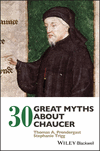CHAUCER WAS A POLITICAL OPPORTUNIST
Summary
Several lines, from the envoi to the poem known as "The Complaint of Chaucer to His Purse," seem innocent enough, especially in the context of the rest of the poem, which embodies his purse as a lover and playfully enjoins her not to be "lyght," rather "Beth hevy ageyn, or elles mot I dye". Its intent, to get the king to make his purse heavy (or at least heavier), could be seen as completely conventional. In addition, there is a suspicion that the poem originally lacked the five-line envoi, but was "dusted off" and re-purposed. Chaucer had minimized his royal connections during the period from 1385 to 1387 when Richard II's power was seemingly on the wane, but given what was happening to Ricardian adherents at this time, this might be seen as prudent self-protection rather than political opportunism.



